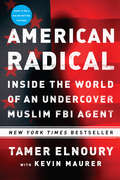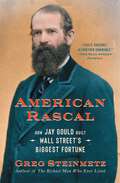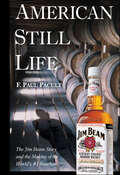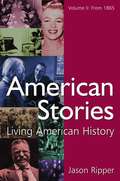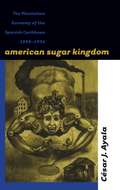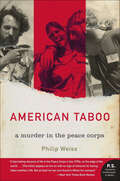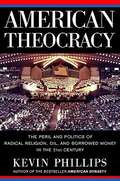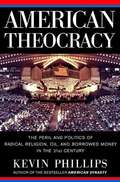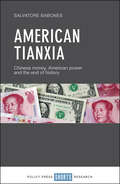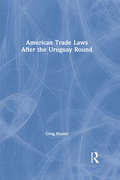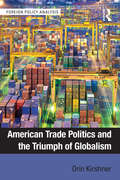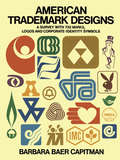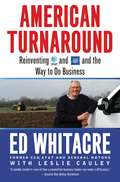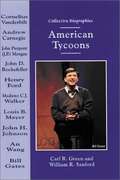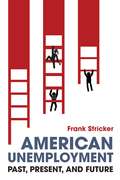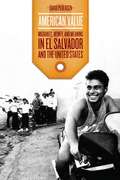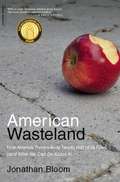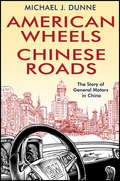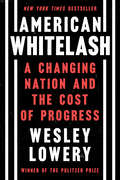- Table View
- List View
American Radical: Inside the World of an Undercover Muslim FBI Agent
by Kevin Maurer Tamer Elnoury<P>The explosive memoir of a Muslim American FBI agent fighting terror from the inside. <P>It’s no secret that federal agencies are waging a broad, global war against terror. But for the first time in this memoir, an active Muslim American federal agent reveals his experience infiltrating and bringing down a terror cell in North America. <P>A longtime undercover agent, Tamer Elnoury joined an elite counterterrorism unit after September 11. Its express purpose is to gain the trust of terrorists whose goals are to take out as many Americans in as public and as devastating a way possible. It's a furious race against the clock for Tamer and his unit to stop them before they can implement their plans. Yet as new as this war still is, the techniques are as old as time: listen, record, and prove terrorist intent. <P>Due to his ongoing work for the FBI, Elnoury writes under a pseudonym. An Arabic-speaking Muslim American, a patriot, a hero: To many Americans, it will be a revelation that he and his team even exist, let alone the vital and dangerous work they do keeping all Americans safe.
American Rascal: How Jay Gould Built Wall Street's Biggest Fortune
by Greg SteinmetzA gripping, &“rollicking&” (John Carreyrou, New York Times bestselling author of Bad Blood) biography of Jay Gould, the greatest of the 19th-century robber barons, whose brilliance, greed, and bare-knuckled tactics made him richer than Rockefeller and led Wall Street to institute its first financial reforms.Had Jay Gould put his name on a university or concert hall, he would undoubtedly have been a household name today. The son of a poor farmer whose early life was marked by tragedy, Gould saw money as the means to give his family a better life…even if, to do so, he had to pull a fast one on everyone else. After entering Wall Street at the age of twenty-four, he quickly became notorious when he paralyzed the economy and nearly toppled President Ulysses S. Grant in the Black Friday market collapse of 1869 in an attempt to corner the market on gold—an event that remains among the darkest days in Wall Street history. Through clever financial maneuvers, he gained control over one of every six miles of the country&’s rapidly expanding network for railroad tracks—coming close to creating the first truly transcontinental railroad and making himself one of the richest men in America. American Rascal shows Gould&’s complex, quirky character. He was at once praised for his brilliance by Rockefeller and Vanderbilt and condemned for forever destroying American business values by Mark Twain. He lived a colorful life, trading jokes with Thomas Edison, figuring Thomas Nast&’s best sketches, paying Boss Tweed&’s bail, and commuting to work in a 200-foot yacht. Gould thrived in an expanding, industrial economy in which authorities tolerated inside trading and stock price manipulation because they believed regulation would stifle the progress. But by taking these practices to new levels, Gould showed how unbridled capitalism was, in fact, dangerous for the American economy. This &“gripping biography&” (Fortune) explores how Gould&’s audacious exploitation of economic freedom triggered the first public demands for financial reforms—a call that still resonates today.
American Still Life: The Jim Beam Story and the Making of the World's #1 Bourbon
by F. Paul PacultThe untold story of the world's premier bourbon and the family that made it #1 American Still Life tells the intertwined true stories of America's favorite whiskey and the family dynasty that produces it to this very day. Jim Beam is the world's top-selling bourbon whiskey, with sales of over five million cases per year. Not a day has passed in the 207 years of Jim Beam's existence when a Beam family member has not been master distiller. Dedicated to quality, and dedicated to the family legacy, the Beams have shepherded their particularly American spirit to the top of their industry. And they've done it in an industry beset by challenges, from government regulation and prohibition, to changing consumer tastes, to fierce new global competition. By creating a brand of unparalleled quality and consistency, and by tying the success of their product with the good name of the family, the Beams have established a lasting legacy as perhaps one of the greatest family business dynasties in American history. Not just a simple history of "America's native spirit" (so named by an act of Congress in 1964) or a simple family history, American Still Life is a story of business success based on quality and attention to detail, constant innovation, revolutionary branding and advertising, and adaptation to the business environment. F. Paul Pacult (Walkill, NY) is recognized the world over as his generation's most accomplished and respected authority on beverage alcohol. He has written for many magazines, including Playboy, Wine and Spirits, Connoisseur, Whisky, Drink, Men's Journal, Cheers, Country Inns, Travel and Leisure, Bon Appetit, Decanter, and Food and Wine. Among his many accomplishments, he has hosted and coproduced two syndicated talk-radio programs and served as the primary expert on whiskey, beer, and wine for the History Channel documentary America Drinks: History in a Glass.
American Stories: Living American History: v. 2: From 1865
by Jason RipperThis book is ideal for any introductory American history instructor who wants to make the subject more appealing. It's designed to supplement a main text, and focuses on "personalized history" presented through engaging biographies of famous and less-well-known figures from 1865 to the present. Historical patterns and trends appear as they are seen through individual lives, and the selection of profiled individuals reflects a cultural awareness and a multicultural perspective.
American Sugar Kingdom
by César J. AyalaEngaging conventional arguments that the persistence of plantations is the cause of economic underdevelopment in the Caribbean, this book focuses on the discontinuities in the development of plantation economies in Cuba, Puerto Rico, and the Dominican Republic in the early twentieth century. Cesar Ayala analyzes and compares the explosive growth of sugar production in the three nations following the War of 1898--when the U.S. acquired Cuba and Puerto Rico--to show how closely the development of the Spanish Caribbean's modern economic and social class systems is linked to the history of the U.S. sugar industry during its greatest period of expansion and consolidation.Ayala examines patterns of investment and principal groups of investors, interactions between U.S. capitalists and native planters, contrasts between new and old regions of sugar monoculture, the historical formation of the working class on sugar plantations, and patterns of labor migration. In contrast to most studies of the Spanish Caribbean, which focus on only one country, his account places the history of U.S. colonialism in the region, and the history of plantation agriculture across the region, in comparative perspective.
American System
by David A. Moss Sarah Brennan Tiffany MorrisCase - Traces the economic development of the United States from 1790 to 1857, focusing especially on the struggle between free traders and protectionists over federal tariff policy. Devotes considerable attention to the nation's political system, its evolving common law, basic factors of production (land, labor, and capital), and key sectors (agriculture, manufacturing, transportation, etc.).
American System
by David A. Moss Sarah Brennan Tiffany MorrisTraces the economic development of the United States from 1790 to 1857, focusing especially on the struggle between free traders and protectionists over federal tariff policy. Devotes considerable attention to the nation's political system, its evolving common law, basic factors of production (land, labor, and capital), and key sectors (agriculture, manufacturing, transportation, etc.).
American Taboo: A Murder in the Peace Corps
by Philip Weiss“The story of how [Dennis Priven] got away with murder . . . a fascinating diorama of life in the Peace Corps in the 1970s, on the edge of the world.” —The New York Times Book ReviewIn 1975, a new group of Peace Corps volunteers landed on the island nation of Tonga. Among them was Deborah Gardner—a beautiful twenty-three-year-old who, in the following year, would be stabbed twenty-two times and left for dead inside her hut.Another volunteer turned himself in to the Tongan police, and many of the other Americans were sure he had committed the crime. But with the aid of the State Department, he returned home a free man. Although the story was kept quiet in the United States, Deb Gardner’s death and the outlandish aftermath took on legendary proportions in Tonga.Now journalist Philip Weiss “shines daylight on the facts of this ugly case with the fervor of an avenging angel” (Chicago Tribune), exposing a gripping tale of love, violence, and clashing ideals. With bravura reporting and vivid, novelistic prose, Weiss transforms a Polynesian legend into a singular artifact of American history and a profoundly moving human story.“This meticulously deconstructed tale of a Peace Corps volunteer murdering another in Tonga and basically getting away with it has to be one of the most exotic true-crime books of recent years, and one of the saddest.” —The Washington Post“[A] compelling and disturbing exposé . . . even novice true crime readers will find this a gripping and deeply sad story that will do little to bolster faith in the U.S. government’s ethical priorities.” —Publishers Weekly (starred review)
American Tax Resisters
by Romain D. Huret"The American taxpayer"--angered by government waste and satisfied only with spending cuts--has preoccupied elected officials and political commentators since the Reagan Revolution. But resistance to progressive taxation has older, deeper roots. American Tax Resisters presents the full history of the American anti-tax movement that has defended the pursuit of limited taxes on wealth and battled efforts to secure social justice through income redistribution for the past 150 years. From the Tea Party to the Koch brothers, the major players in today's anti-tax crusade emerge in Romain Huret's account as the heirs of a formidable--and far from ephemeral--political movement. Diverse coalitions of Americans have rallied around the flag of tax opposition since the Civil War, their grievances fueled by a determination to defend private life against government intrusion and a steadfast belief in the economic benefits and just rewards of untaxed income. Local tax resisters were actively mobilized by business and corporate interests throughout the early twentieth century, undeterred by such setbacks as the Sixteenth Amendment establishing a federal income tax. Zealously petitioning Congress and chipping at the edges of progressive tax policies, they bequeathed hard-won experience to younger generations of conservatives in their pursuit of laissez-faire capitalism. Capturing the decisive moments in U. S. history when tax resisters convinced a majority of Americans to join their crusade, Romain Huret explains how a once marginal ideology became mainstream, elevating economic success and individual entrepreneurialism over social sacrifice and solidarity.
American Theocracy
by Kevin PhillipsAn explosive examination of the coalition of forces that threatens the nation, from the bestselling author of American Dynasty In his two most recent bestselling books, American Dynasty and Wealth and Democracy, Kevin Phillips established himself as a powerful critic of the political and economic forces that rule--and imperil--the United States, tracing the ever more alarming path of the emerging Republican majority's rise to power. Now Phillips takes an uncompromising view of the current age of global overreach, fundamentalist religion, diminishing resources, and ballooning debt under the GOP majority. With an eye to the past and a searing vision of the future, Phillips confirms what too many Americans are still unwilling to admit about the depth of our misgovernment.
American Theocracy: The Peril and Politics of Radical Religion, Oil and Borrowed Money in the 21st Century
by Kevin PhillipsFrom America's premier political analyst, an explosvie examination of the coalition of forces that threatens the nation in this century.
American Tianxia: Chinese Money, American Power and the End of History
by Salvatore BabonesAfter a meteoric rise, China's once inexorable growth has come to a screeching halt. With it ends China's dream of establishing a new tianxia (‘harmonious order’) in Asia with China at its centre. Salvatore Babones provides an up-to-date assessment of China's economic problems and how they are undermining China's challenge to the Western-dominated world order. As China's neighbours and many of its own most talented people look to the United States to ensure their security and prosperity, global power is slowly but surely consolidating in a twenty-first century American Tianxia. A closely argued antidote to defeatist accounts of Western decline, this book tells the story of how liberal individualism has become the leitmotif of the American Tianxia, an emerging world-system in which people of all nationalities seek a share in the economic, cultural, and political system that is America writ large.
American Trade Laws After the Uruguay Round
by Greg MastelThis text seeks to anaylze the three pillars of US trade law: Section 301, aimed at opening foreign markets for US exports; anti-dumping law, which seeks to counter anti-competitive tactics by foreign firms; and counterveiling duty law that aims to counter foreign governmental law.
American Trade Politics and the Triumph of Globalism (Foreign Policy Analysis)
by Orin KirshnerA deep and unresolved tension exists within American trade politics between the nation’s promotion of an open world trading system and the operations of its democratic domestic political regime. Whereas most scholarly attention has focused on how domestic politics has interfered with the United States’ global economic leadership, Orin Kirshner offers here an analysis of the ways in which U.S. leadership in the arena of global trade has affected American democracy and the domestic political regime. By participating in multilateral trade agreements, the U.S. Congress has transferred its trade policymaking authority to the president and, through international trade negotiations, from the American state to the GATT/WTO regime. This reorganization of policymaking authority has resulted in the "triumph of globalism," and fundamentally alters the citizen-state relationship assumed in democratic theory. Kirshner illustrates this process through four case studies: The Reciprocal Trade Agreements Act of 1945, The Trade Expansion Act of 1962, The Trade Act of 1974, The Omnibus Trade and Competitiveness Act of 1988, and further examines the impact of the Uruguay Round Agreements Act of 1994 on the political and institutional structure of American trade politics up to the current period. American Trade Politics and the Triumph of Globalism makes a significant contribution to the study of both international trade and domestic American politics. This is essential reading for students and scholars of trade policy, international political economy, American politics, and democratic theory.
American Trademark Designs
by Barbara Baer CapitmanArranged by category, these 732 American trademarks and symbols represent a variety of fields, including entertainment, education, real estate, insurance, food and beverages, retail, transportation, utilities, and heavy industry. The black-and-white images feature captions that identify the trademark, the year of design, and -- when known -- the designer's name.
American Turnaround: Reinventing AT&T and GM and the Way We Do Business in the USA
by Leslie Cauley Edward WhitacreEd Whitacre is credited with taking over the corporate reins at General Motors (GM) when the automotive manufacturer was on the brink of bankruptcy during 2009 and turned the company around in magnificent fashion. In this business memoir, the native Texan explores his unique management style, business acumen and patriotism.It was President Obama who reached out to Ed Whitacre to come out of retirement and take over GM in 2009. A down-to-earth, no-nonsense Texas native with a distinctive Texas twang in his voice, Whitacre was reluctant to come out of retirement to work at GM. But Whitacre is that rare CEO with great charisma and extraordinary management instincts. And when he got to Detroit, he started to whittle down the corporate bureaucracy right away - and got GM back on track in record timeBefore being pulled out of retirement to run GM by Obama, Ed Whitacre had spent his entire corporate career in the telecom business, where he ultimately ended up running AT&T.
American Tycoons (Collective Biographies)
by Carl R. Green William R. SanfordEach book presents ten short biographies of important people for the price of a single volume. - This series includes books that are organized around interesting themes, highlight possible career choices, and include women and minorities.
American Unemployment: Past, Present, and Future
by Frank StrickerThe history of unemployment and many concepts surrounding it remain a mystery to many Americans. Frank Stricker believes we need to understand this essential thread in our shared past. American Unemployment is an introduction for everyone that takes aim at misinformation, willful deceptions, and popular myths to set the record straight: <P><P> Workers do not normally choose to be unemployed. In our current system, persistent unemployment is not an aberration. It is much more common than full employment, and the outcome of elite policy choices. Labor surpluses propped up by flawed unemployment numbers have helped to keep real wages stagnant for more than forty years. Prior to the New Deal and the era of big government, laissez-faire policies repeatedly led to depressions with heavy, even catastrophic, job losses. Undercounting the unemployed sabotages the creation of government job programs that can lead to more high-paying jobs and full employment. <P><P> Written for non-economists, American Unemployment is a history and primer on vital economic topics that also provides a roadmap to better jobs and economic security.
American Value: Migrants, Money, and Meaning in El Salvador and the United States
by David PedersenOver the past half-century, El Salvador has transformed dramatically. Historically reliant on primary exports like coffee and cotton, the country emerged from a brutal civil war in 1992 to find much of its national income now coming from a massive emigrant workforceOCoover a quarter of its populationOCothat earns money in the United States and sends it home. In American "Value," David Pedersen examines this new way of life as it extends across two places: Intipuci, a Salvadoran town infamous for its remittance wealth, and the Washington, DC, metro area, home to the second largest population of Salvadorans in the United States. aPedersen charts El SalvadorOCOs change alongside American deindustrialization, viewing the Salvadoran migrant work abilities used in new lowwage American service jobs as a kind of primary export, and shows how the latest social conditions linking both countries are part of a longer history of disparity across the Americas. Drawing on the work of Charles S. Peirce, he demonstrates how the defining value formsOComigrant work capacity, services, and remittancesOCoact as signs, building a moral world by communicating their exchangeability while hiding the violence and exploitation on which this story rests. Theoretically sophisticated, ethnographically rich, and compellingly written, "American Value" offers critical insights into practices that are increasingly common throughout the world.
American Wasteland
by Jonathan BloomThe "Traffic" and "Affluenza" of food waste: an eye-opening account of our culture of excess and waste?and what we can do to change it
American Wasteland: How America Throws Away Nearly Half of Its Food (and What We Can Do About It)
by Jonathan BloomThe Traffic and Affluenza of food waste: an eye-opening account of our culture of excess and waste--and what we can do to change it
American Well: The DTC Decision
by Natalie Kindred Elie OfekIn late 2013, telehealth company American Well, which developed a digital platform that allowed patients to conduct online medical consultations with physicians, is considering pursuing a direct-to-consumer (DTC) strategy. Founded in 2006, American Well had, to date, primarily sold its solution to health plans, which then provided online care services to their members using their own brand name. But while American Well attracted some of the largest U.S. health insurers as clients, a surprisingly small number of individual members had actually used the online care service. American Well management believed low consumer awareness-the result of insufficient marketing by health plans, among other factors-was hampering uptake of what should be a highly valuable offering for all stakeholders involved. They wondered if a DTC approach, in which American Well would become a consumer brand and market a telehealth service directly to the public, for example through a mobile app, could drive utilization and catapult the business to the next level. If a DTC offering were given the green light, the company had to come up with a coherent marketing plan to launch it and figure out how to manage potential conflicts with existing clients, who might view the move as competing with their own telehealth efforts. Moreover, the move had to be considered in light of other initiatives the company had recently embarked on, such as marketing its platform to pharmacy chains, targeting large employers, and selling kiosks that provided a physical space to conduct online consultations. The case forces students to grapple with the challenges and barriers involved in disrupting an established industry, examine alternative go-to-market strategies and the timing of implementing them, and consider different business models to manage supply and generate revenues. The case also offers a rich analysis of digital marketing issues.
American Well: The Doctor Will E-See You Now
by Elie Ofek Ron LauferWhat is next for healthcare IT provider American Well, whose innovative Online Care technology allows physicians to deliver care to patients online in real time? Using American Well's platform, patients with non-emergency health concerns can communicate with physicians online or by phone and receive advice or even a diagnosis without having to visit the physician's office. American Well's co-founders, Ido Schoenberg and Roy Schoenberg, believe this platform will reduce the cost of care delivery; create new revenue-earning opportunities for providers; and contribute to a more efficient, convenient healthcare delivery system. While the platform could benefit insurers, providers, employers, and patients alike, the company has only marketed to a few health insurance companies to date. In November 2009, 3 insurers have adopted the technology, and American Well expects several more to do so over the next 12 months. As the company plans to accelerate adoption by health insurers, it is also considering other growth options. Is it too early to commit resources to developing and marketing American Well's second-generation product, which facilitates real-time connectivity between primary care physicians and specialists? Should American Well pursue new markets in the U.S., such as hospitals, chains of clinics, and pharmacies, or even expand internationally? In a broader sense, American Well's technology solves the economic obstacle of time and place by connecting excess supply (of physician capacity) with excess demand (for patient care). Could this model be adapted to other industries, such as legal and accounting services? Alternatively, should American Well continue to focus solely on its primary product and on becoming the leader in the Online Care Industry?
American Wheels, Chinese Roads: The Story of General Motors in China
by Michael J. DunneHow could one company—General Motors—meet disaster on one continent and achieve explosive growth on another at the very same time? While General Motors was hurtling towards bankruptcy in 2009, GM’s subsidiary in China was setting new sales and profit records. This book reveals how extraordinary people, remarkable decisions and surprising breaks made triumph in China possible for General Motors. It also shows just how vulnerable that winning track record remains. No small part of GM’s success in China springs from its management of shifting business and political relationships. In China, the government makes the rules for—and competes in—the auto industry. GM’s business partner, the City of Shanghai, is both an ally and a competitor. How does such an unnatural relationship work on a day-to-day basis? Where will it go on the future? General Motors also engages in constant battles with other global and Chinese car makers for the hearts of demanding Chinese consumers. Dunne gives us rare glimpses into the mindsets and behavior of this new moneyed set, the worlds newest class of wealthy consumers. China is already the number one car market in the world. During the next ten years, China will export millions of cars and trucks globally, including to the United States. American Wheels, Chinese Roads presents readers with fascinating illustrations of what to expect when Chinese cars, companies, and business people arrive on our shores.
American Whitelash: A Changing Nation and the Cost of Progress
by Wesley LoweryNEW YORK TIMES BESTSELLERAn NPR Best Book of the Year • Kirkus Reviews Best Book of the YearLonglisted for the 2024 Andrew Carnegie Medal for Excellence“American Whitelash is indispensable. Really. It is.” – Ibram X. Kendi, author of How to Be an AntiracistPulitzer Prize–winning journalist Wesley Lowery confronts the sickness at the heart of American society: the cyclical pattern of violence that has marred every moment of racial progress in this country, and whose bloodshed began anew following Obama’s 2008 election.In 2008, Barack Obama’s historic victory was heralded as a turning point for the country. And so it would be—just not in the way that most Americans hoped. The election of the nation’s first Black president fanned long-burning embers of white supremacy, igniting a new and frightening phase in a historical American cycle of racial progress and white backlash.In American Whitelash, Pulitzer Prize–winning journalist and best-selling author Wesley Lowery charts the return of this blood-stained trend, showing how the forces of white power retaliated against Obama’s victory—and both profited from, and helped to propel, the rise of Donald Trump. Interweaving deep historical analysis with gripping firsthand reporting on both victims and perpetrators of violence, Lowery uncovers how this vicious cycle is carrying us into ever more perilous territory, how the federal government has failed to intervene, and how we still might find a route of escape.
